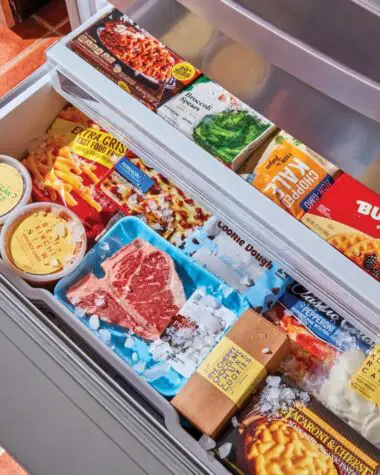We have all been there: scouring or cleaning our freezer out and discovering food that has since been forgotten. This would then make us wonder. Is it still good? We’d look at its expiration date and find out it has since passed.
Chances are you’d impulsively toss it out in the bin nearest to you, but hold on for a moment; what if I tell you that frozen food past its labeled expiration date is still safe for consumption? Would that change your mind otherwise?
In this article, we will be looking at everything you need to know about frozen foods that have already passed their supposed expiration dates. Are they really safe for consumption still? Read on as we try to answer just that.
Are Frozen Foods Safe Even After Expiration Date?
To give the answer straight, yes, frozen foods that are past their labeled expiration dates are safe to eat.
Here is why. Foodborne bacteria do not grow in the freezer. Freezing food suspends the bacteria that may be present in the food and keeps them inactive as long as the food is frozen. This means that no matter how long a food is frozen, it is safe to eat.
That being said, foods that have been in the freezer for months may appear dry once thawed or defrosted. Moreover, they wouldn’t taste as good. Say that you find a package of ground beef that has been sitting in the corner of your freezer for months now; you can still find some use for it and, therefore, make the most out of your money for it.
Instead of throwing it out just because it has passed its expiration date, it could be a good idea to use it instead to make tacos or chili. The additional ingredients and seasonings can compensate for the loss of flavor expected in foods that have passed their respective expiration dates.
Do Frozen Foods Expire?
Frozen foods can last indefinitely in a good freezer and still be safe for consumption; however, their quality and taste would suffer relative to how long they are kept in there. Freezer burn should start affecting your frozen food after approximately three to six months after it has been put in your freezer.
Again, they would still be completely safe to eat. That said, freezer burn will dehydrate your food and dissipate its innate texture and flavor. One excellent tip to reduce the effects of freezer burn in your food is to try and get as much air out of its packaging as you can.
So, what is freezer burn? What are its effects and how does it occur?
What is Freezer Burn?
Freezer burn is the term used to refer to the loss of moisture on frozen foods. It happens when meat left in your freezer for too long starts to lose moisture and appears discolored or faded. Not only is the food’s appearance affected, but freezer burn also makes its overall texture appear tough and significantly affects its taste. Meat that has suffered from freezer burn usually tastes very bland.
When frozen meat gets freezer burn, it appears brownish or grayish in color. Furthermore, their texture would also appear grainy, tough, and visibly very dry. This happens because oxygen in the nearby air has pulled the colors from your meat’s tissue – this also includes its flavors, explaining why it tastes bland once cooked.
There are two main reasons your meat and frozen foods get freezer burn: they can either have stayed in a frozen space for so long that a lot of the water molecules have already moved off of it, or the food wasn’t wrapped securely before it was placed in the freezer.
How Long Do Frozen Foods Last Once They Past their Expiration Dates?
While it has since been concretely established that eating food products past their expiration date isn’t necessarily a bad thing, this does not mean you’d want to eat them. Storing certain foods too long can make them look or taste ‘bad’ due to the aforementioned freezer burn or just drying out.
Additionally, suppose food has been stored improperly or allowed to reach temperatures above the recommended 0 degrees Fahrenheit. In that case, it may be unsafe to eat, even if the food itself isn’t past its labeled expiration date. As a general rule, if a food has a strange or rotten smell after thawing, it’s better to be safe and throw them out.
Here is a short list of the common foods and how long they will maintain their freshness and quality inside a freezer at the recommended setting of 0 degrees Fahrenheit:
| Food Product | Length of Storage in Freezer |
|---|---|
| Fruits and Vegetables | 8 to 12 months |
| Raw or Ground Beef and Pork | 3 to 4 months |
| Whole Chicken or Turkey | 12 months/ 1 year |
| Cured or Processed Meat (Sausages, Bacons, etc.) | 1 to 2 months |
| Cooked Fish | 4 to 6 months |
| Raw Steaks or Roasts | 4 to 12 months |
| Raw Eggs | 12 months/ 1 year |
| Typical Frozen Food Products/ TV Dinners | 3 to 4 months |
To stay on top of when certain foods go bad in the freezer and for a more comprehensive list just like this, you may refer to our article about how long you can keep frozen food in the freezer.
Can You Increase the Storage Time of Frozen Foods?
In addition to the natural storage time of the food itself, how particular foods are packaged, stored, or prepared significantly affects how long they will maintain their freshness and quality in the freezer.
Needless to say, correctly packaging, storing, and preparing food keeps it from spoiling quickly via the limitation of air exposure which, in turn, reduces ice crystal buildup in the food.
As for vegetables, blanching them before putting them in the freezer helps preserve their nutritional value, natural taste, texture, and color. To blanch vegetables properly, submerge them in boiling water for a few moments, then immediately transition them into ice-cold water to halt the cooking process. Think of it as how blacksmiths do with their sword creations.
It is highly recommended that you store food in vapor-resistant, airtight containers or packaging to prevent air exposure and odors that can cause the flavor of the food to go bad.
Furthermore, freeze food as fast as possible to prevent unnecessary ice crystal buildup that can lead to the food becoming dry after thawing. Do this by spreading out the food into an even layer.
Doing these things increases the storage time of frozen foods inside your freezer.
How to Tell if Frozen Food has Already Gone Bad?
Although we have already established that food that has been securely frozen can be safely consumed even after its labeled expiration date, of course, you would still need to figure out when enough is enough and if that particular food has already gone way past its storage time.
With that being said, here are some obvious signs that frozen food has already lost most, if not all, of its quality and may have already gone bad.
- Freezer Burned – we have already discussed this above. While food that has suffered from freezer burn is technically still safe to eat, it may already have an undesirable texture and taste. Take note that if only a small section of the food suffered from freezer burn, you may freely cut affected portions off and safely eat the rest.
- It has an awful smell – after thawing, make it a point to give food a good old sniff test. If it smells awful, rancid, or rotting, it may be wiser to just toss it out rather than taking chances.
- Its color drastically changed – check the degree of severity of the food’s discoloration after thawing. While change of color is natural to food that has been frozen, darkened or significantly faded food can indicate spoilage.
- Mushy or slimy texture – feel the food out and identify if it has a mushy or slimy texture. If yes, chances are the food is already bacteria-ridden and thus, already spoiled.
Conclusion
There you have it! That is everything you should know about frozen foods that are already past their expiration dates. While such is proven to be safe for consumption, the decision on what to do with them still falls into your hands. No one should judge you for making the most out of your hard-earned money by still finding a way to make use of them, as with just plainly tossing them to the bin to be 100% safe.
Curious about the proper methods for thawing food? You may want to read our article about the three proper methods for thawing food right here.










